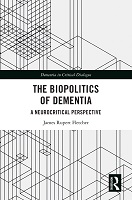The Biopolitics of Dementia
Proposal review
A Neurocritical Perspective
Abstract
This book explores how dementia studies relates to dementia’s growing public profile and corresponding research economy.
The book argues that a neuropsychiatric biopolitics of dementia positions dementia as a syndrome of cognitive decline, caused by discrete brain diseases, distinct from ageing, widely misunderstood by the public, that will one day be overcome through technoscience. This biopolitics generates dementia’s public profile and is implicated in several problems, including the failure of drug discovery, the spread of stigma, the perpetuation of social inequalities and the lack of support that is available to people affected by dementia. Through a failure to critically engage with neuropsychiatric biopolitics, much dementia studies is complicit in these problems.
Drawing on insights from critical psychiatry and critical gerontology, this book explores these problems and the relations between them, revealing how they are facilitated by neuro-agnostic dementia studies work that lacks robust biopolitical critiques and sociopolitical alternatives. In response, the book makes the case for a more biopolitically engaged ""neurocritical"" dementia studies and shows how such a tradition might be realised through the promotion of a promissory sociopolitics of dementia.


 Download
Download